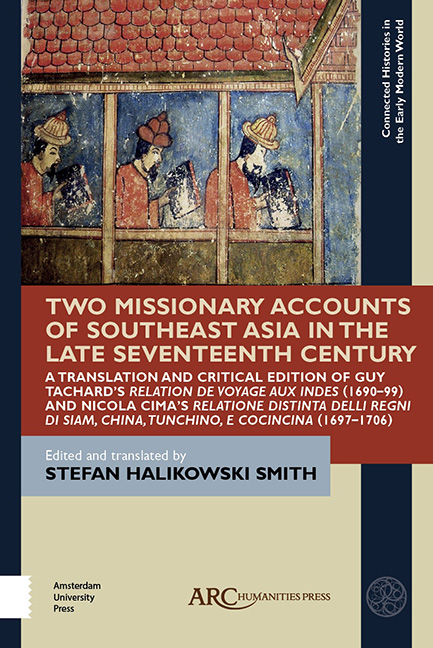 Two Missionary Accounts of Southeast Asia in the Late Seventeenth Century
Two Missionary Accounts of Southeast Asia in the Late Seventeenth Century Book contents
- Frontmatter
- Contents
- List of Illustrations
- Acknowledgements and Aids to Research
- Brief Chronology of the Lives and Movements of Guy Tachard s.j. (1651–1712) and Nicola Agustin Cima O.E.S.A. (1650–1722)
- Introduction
- PART ONE PRESENTATION OF GUY TACHARD S.J., RELATION DE VOYAGE AUX INDES (1690–99)
- PART TWO PRESENTATION OF NICOLA CIMA, O.E.S.A. RELATIONE DISTINTA DELLI REGNI DI SIAM, CHINA, TUNCHINO, E COCINCINA (CA. 1707)
- Bibliography
- Index
The Relatione Distinta delli Regni di Siam, China, Tunchino, e Cocincina
Published online by Cambridge University Press: 24 December 2020
- Frontmatter
- Contents
- List of Illustrations
- Acknowledgements and Aids to Research
- Brief Chronology of the Lives and Movements of Guy Tachard s.j. (1651–1712) and Nicola Agustin Cima O.E.S.A. (1650–1722)
- Introduction
- PART ONE PRESENTATION OF GUY TACHARD S.J., RELATION DE VOYAGE AUX INDES (1690–99)
- PART TWO PRESENTATION OF NICOLA CIMA, O.E.S.A. RELATIONE DISTINTA DELLI REGNI DI SIAM, CHINA, TUNCHINO, E COCINCINA (CA. 1707)
- Bibliography
- Index
Summary
The Augustinian missionary Nicola Agustin Cima's Relatione Distinta delli Regni di Siam, China, Tunchino, e Cocincina, a manuscript of sixty-six pages completed around 1707 and kept in the Marciana Library, Venice under the shelfmark Ital. Cl. VI.76 (6036) was, frankly speaking, an unexpected find whilst researching other matters there. It is both a prescriptive document put forward for deliberation by the Venetian Senate, and a tour d’horizon of the commercial and political possibilities offered in the Orient. Having worked on a number of roughly contemporary missionaries in South-East Asia, I was immediately intrigued as to why the author of this memorandum, Nicola Agustin Cima, was unknown to me, and went unmentioned in the stock literature. I was to find out that even his primary editor, Francesco Surdich, considered Cima a “somewhat neglected (trascurato) personality, if not [to say] completely ignored.”
In my earlier work, I had tried to categorize, or at least clarify, the types of missionary working in the Asian mission fields: first the anunciadores, or self-styled “apostles to the Gentiles,” charismatic individuals destined for mass conversion like Samuel Fritz, “Apóstolo das Amazonas”; secondly, the bedrock missionaries—stable, often hard workers who spent their lives in one mission attending to the needs of their church communities (into which category I would place the Jesuit Maldonado de Mons); and finally the “floating clergy,” like the Italian Franciscan G. B. Morelli, who were of questionable impact on the mission fields, and whose “turbulence” often only stimulated internecine rivalries among the orders. Cima was, it seems, if not “turbulent” then of marginal impact, and, as we shall see from this text, distracted from any spiritual purpose. Many of his recommendations not only appear fleetingly and extremely speculatively, but would be interpreted by psychoanalysts as frankly delusional, both in the sense of a personal delusion de grandeur, but also with respect to a shocking ignorance of political realities around him. One is reminded of a bureaucrat in Madrid, who commented that those sent on missions were “not the most lucid” members of their orders.
A number of questions, however, emerge, particularly when cross-referenced to other traces Cima has left in the historical record
- Type
- Chapter
- Information
- Two Missionary Accounts of Southeast Asia in the Late Seventeenth CenturyA Translation and Critical Edition of Guy Tachard's Relation de Voyage aux Indes (1690–99) and Nicola Cima's Relatione Distinta delli Regni di Siam, China, Tunchino, e Cocincina (1697-1706), pp. 155 - 180Publisher: Amsterdam University PressPrint publication year: 2019


